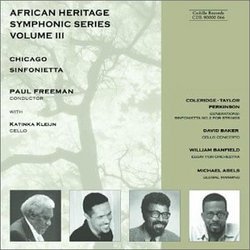| All Artists: Katinka Kleijn, Paul Freeman, Chicago Sinfonietta Title: African Heritage Symphonic Series, Volume 3 Members Wishing: 0 Total Copies: 0 Label: Cedille Release Date: 1/28/2003 Genre: Classical Styles: Forms & Genres, Concertos, Symphonies Number of Discs: 1 SwapaCD Credits: 1 UPC: 675754566821 |
Search - Katinka Kleijn, Paul Freeman, Chicago Sinfonietta :: African Heritage Symphonic Series, Volume 3
 | Katinka Kleijn, Paul Freeman, Chicago Sinfonietta African Heritage Symphonic Series, Volume 3 Genre: Classical
|
Larger Image |
CD Details |
CD ReviewsA very enterprising issue: of regrets and of hope. David A. Hollingsworth | Washington, DC USA | 02/28/2004 (5 out of 5 stars) "The regrets? That the exposure of Black American composers are not reaching it fuller bloom that it deserves. Other than the recordings made by Neemi Jarvi, Paul Freeman and about a handful of others, there are very few recordings of their music to be found, which is not quite easy to do in the first place. Scott Joplin's piano music is fairly well-known and pioneered. But even most of the music of William Grant Still failed to find more ardent of advocates and champions. Hence I only could find two symphonies of his recorded to date, one of which is his First, entitled "Afro-American" (originally scored for piano). But even I myself could not, until now at least, call myself a more forceful advocate. So with that, what's the hope? That more performers and listeners will dive right into the works of Afro-American composers and realize their important contributions in the development of American music. And that even I would do more in advocating their music, for they indeed had something to say, and with that unrelenting sense of soulfulness and candor that even I, for the likes of me, cannot see why they should in anyway be overlooked. This disc, Volume III of the African Heritage Symphonic Series, is the type that would prove the skeptics wrong in whatever misconceptions that they may have in their minds. It is a very enterprising issue, with the pieces admirable in their own rights. I'm especially warmed to Michael Abels' "Global Warming". Composed in 1990, structurally it's sort of an ABCBA design, with a beginning that's mysterious (and violin playing that's folkloristic in character yet quite elusive in temperament). The episodes that follow reminiscence the Irish and Middle-Eastern folkdances. The Irish dance is especially appealing and imaginative, and would have done, I would think, Sir Malcolm Arnold especially proud. But the Middle Eastern dance is barely less attractive, with an exotic coloring and instrumentation that reminds me of Kara Karayev (among the most important Azeri composers of the last Century). The Irish dance returns, but with the percussion writing that's more exotic and more rhythmically African in nature before the reprisal of the mysterious beginning of the score. The other works of this likeable series are likewise memorable. David Baker's Cello Concerto (1975) is structurally straightforward, yet the mood has sort of an ambiguity about it. The first movement (tempo: fast) is more of a lento, temperamentally serious and reflective. It's meditative as in the case of the second movement (tempo: slow a la recitative), which is Avant Gardish in style. But turn to the last movement (tempo: fast), and the writing becomes more extroverted. But, much of the quiet, elusive disposition of the piece can be found in William Banfield's Essay for Orchestra (1994), an otherwise interesting work, an abstract piece of musical art. Not quite as abstract in Coleridge-Taylor Perkinson's Generations: Sinfonietta no. II for Strings (1996), which is nostalgic yet dignified. The allegro that followed the misterioso in the first movement have sort of the Dvorakian sweetness about it. Even the alla burletta third movement is playful and something even Still would have been proud to claim as his own. But, the alla sarabande second movement captures me quite strongly. It's a very beautiful, elegant movement: a tad melancholic and searching in orientation, but with that unabashed gracefulness that only strengthens the work's overall sense of purpose. And much praise is due to Paul Freeman and the Chicago Sinfonietta, who perform the works with pure conviction and sensitivity. Their reading of Baker's Concerto is particularly gripping, thanks in large part to cellist Katinka Kleijn, who plays the work with convincing insightfulness. Dominique-Rene de Lerma program notes are excellent and the recordings are euphoniously realistic. No doubt the issue that offers hope for greater exposure of these fine composers and with no regrets for having to enjoy it in all its full, impenitent glory." Here's hoping it's really not the final CD! AfroAmericanHeritage | Wisconsin | 04/01/2004 (5 out of 5 stars) "This is the final release in an outstanding three-CD series devoted to twentieth-century composers of African descent. It presents four works by living composers working in the mainstream of contemporary music. Michael Abels (b.1962) wrote "Global Warming" in 1990, not long after the Berlin Wall fell. It reflects both environmental and international warming, incorporating folk music from various cultures. David Baker's (b. 1931) "Cello Concerto" is lyrical and jazz influenced. "Essay for Orchestra" by William Banfield (b. 1961) is from a larger work for percussion and orchestra, a blend of jazz influences and 19th Century Romanticism. The structure of "Generations: Sinfonietta No. 2 for Strings" by Coleridge-Taylor Perkinson (b. 1932) is "somewhat autobiograhpical" representing the composer's family relationships. It combines folk melodies, dances, and the B-A-C-H idea in what David Hurwitz called "a Bartókian synthesis." The program notes, written in an engaging style by Dominique-Rene de Lerma, provide a thorough introduction to the work of all four composers."
|

 Track Listings (9) - Disc #1
Track Listings (9) - Disc #1